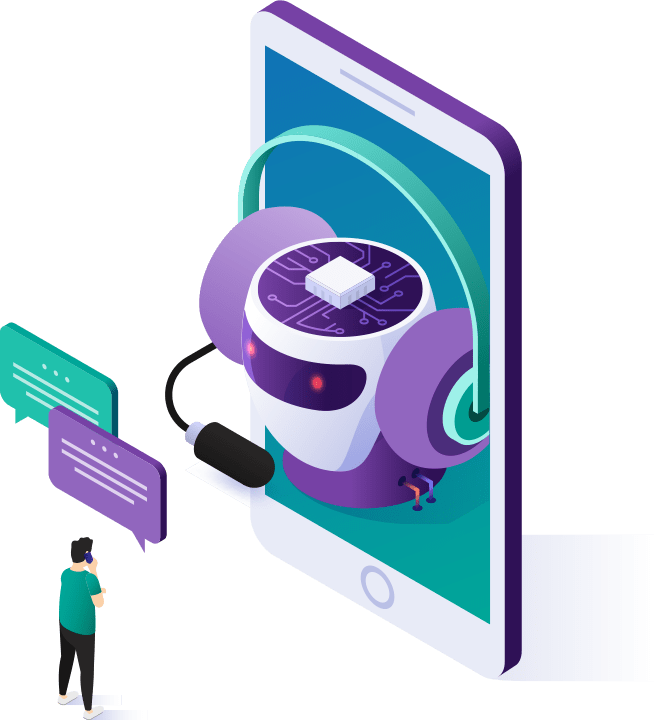Build Your Contact Center Team on a Budget with Virtual Agents
Help more customers with efficiency and personalization using virtual agents.

Automate routine tasks with virtual agents
Give your customers the experience they deserve quickly, simply, and without having to press any buttons. IVR automation tools can provide:
- Enhanced Customer Service: Say goodbye to impersonal IVR menus. Allow your customers to interact with intelligent virtual agents that provide natural and human-like conversations.
- 24/7 Availability: Never miss a customer call, even after hours. Our virtual agents are always on, providing round-the-clock support, and freeing up your human agents to focus on more complex tasks.
- Efficiency and Cost Savings: Reduce operational costs by automating routine tasks and inquiries. Our virtual agents handle repetitive queries, leaving your live agents to tackle higher-value interactions.
- Data-Driven Insights: Gain valuable insights into customer behavior and preferences with SmartAction’s analytics. Use this data to make informed decisions, personalize customer interactions, and optimize your processes.
- Seamless Transition: Transitioning from traditional IVR to our virtual agents is a breeze. Our technology integrates effortlessly with your existing systems, ensuring a smooth and painless migration.

Contact Center Virtual Agents
Contact center virtual agents are reconfiguring the way businesses handle their customer interactions on a daily basis, providing an intelligent, scalable solution for streamlining communication and broadly enhancing the customer experience. By leveraging advanced artificial intelligence (AI) technologies, contact center virtual agents can efficiently manage a wide range of tasks, from fielding inquiries and resolving issues to offering better recommendations and support.
One of the key components of a successful contact center virtual agent is the AI call assistant. This innovative technology enables businesses to analyze and respond to customer inquiries in real time, delivering accurate information and resolving concerns with minimal human intervention. The AI call assistant is designed to understand natural language processing (NLP), allowing it to comprehend complex queries, detect emotion within conversations, and adapt accordingly. This not only improves the overall efficiency of a contact center but also elevates the level of customer satisfaction.
As a result of these advancements in AI technology, we have witnessed the emergence of the AI call center agent – capable of handling multiple tasks simultaneously. Unlike their human counterparts who juggle between multiple screens, files or systems to gather requisite data for answering customer queries; these AI-powered agents can process large volumes of data instantaneously without losing focus on the task at hand. Consequently, this superior ability allows them to provide more accurate responses while significantly reducing operational costs for businesses.
Contact center virtual agents serve as an indispensable tool for driving improved efficiency and enhancing customer experiences in today’s fast-paced digital landscape. By incorporating advanced features such as AI call assistants and intelligent virtual agent capabilities into their operations, businesses can meet the ever-growing expectations of their customers while maintaining cost-effective operations.
AI Contact Center
The advent of artificial intelligence has brought about a paradigm shift in various industries, with one significant impact being the transformation of call centers into AI contact centers. By integrating advanced technologies, businesses can now enhance their customer support services and streamline operations to meet the ever-evolving demands of the modern consumer. In this informative piece, we shall delve deep into the realm of AI contact center solutions as well as explore their associated benefits.
One highly sought-after component within the AI contact center is the AI call bot. These virtual agents are designed to handle a broad range of customer queries by simulating human conversations through natural language processing (NLP) and machine learning algorithms. As a result, they can deliver quick and accurate responses while enabling a more personalized experience for each caller. This technology not only reduces wait times but also ensures that customers have their issues resolved effectively without needing to be transferred between representatives.
The integration of contact center AI not only benefits consumers but also plays a crucial role in enhancing employee productivity. Through machine learning and data analytics, these systems can analyze vast amounts of customer data to identify patterns or trends that could lead to potential improvements in service delivery. Moreover, it allows companies to assign tasks to bots capable of handling repetitive inquiries while empowering human agents to focus on more complex issues requiring empathy or critical thinking skills.
With an AI call center in place, organizations can expect improved efficiency since these systems have automated features capable of reducing average handling times and providing relevant information instantly. In addition, this cutting-edge technology enables seamless communication across multiple channels such as voice calls, text messages, emails, and social media platforms – ensuring that customers get prompt assistance irrespective of their preferred mode of interaction.
Virtual Agent vs Chatbot
The fascinating world of artificial intelligence has given rise to various terminologies, two of which are “virtual agent” and “chatbot.” While these terms are often used interchangeably, there exist subtle yet significant differences between them. Both virtual agents and chatbots involve computer programs designed to interact with humans through text or voice communication. However, their applications and underlying technology may differ in certain aspects.
Diving deeper into the realm of AI-powered conversational tools, we happen upon another critical distinction: conversational AI vs generative AI. Conversational AI refers to a system that can understand and respond to human language inputs in a cohesive manner, simulating human-like conversation. This technology bases its responses on predefined rules and pre-existing knowledge.
In contrast, generative AI focuses on creating original content autonomously by learning from vast amounts of data. The output generated is not restricted by pre-set templates or rules but rather evolves organically within the context of the conversation. Now, let us circle back to our primary topic – virtual agent vs chatbot – and examine the nuances between these two concepts. Virtual agents typically possess more advanced capabilities than chatbots when it comes to understanding complex queries and offering more personalized responses. They tend to leverage sophisticated technologies like natural language processing (NLP), machine learning (ML), and even elements from generative AI for improved interaction quality.
On the other hand, a virtual chatbot relies primarily on scripted responses based on specific keywords or phrases input by users. Their functionality remains relatively simple compared to virtual agents due to limited contextual understanding and response generation capabilities. Another aspect worth considering is the application domain: a virtual agent finds use in fields that require higher levels of personalization or customer support assistance such as banking, insurance, retail sales, and healthcare industries. Meanwhile, chatbots are often employed for simpler tasks like answering frequently asked questions, conducting surveys or polls, providing weather updates, etc., although advancements in AI have led to chatbots evolving into more sophisticated tools over time.
Contact Center Automation
One of today’s most notable contact center automation trends involves leveraging artificial intelligence (AI) to improve agent performance and customer engagement. Organizations are investing in state-of-the-art technologies that harness the power of AI and machine learning to predict customer behavior, analyze interactions, and offer personalized solutions. These advancements not only enhance agent productivity but also lead to a more satisfying user experience.
The integration of AI-driven chatbots is another prominent example of contact center automation tools making their way into the industry. With natural language processing capabilities, these virtual assistants can handle routine inquiries, assist with account management tasks, or even provide product recommendations based on customer preferences. By resolving common issues without human intervention, these automated bots free up agents to focus on more complex queries that require a higher level of expertise.
In addition to these AI-driven innovations, multichannel communication platforms have emerged as key players in contact center automation efforts. These platforms allow businesses to engage with customers across multiple channels such as email, phone calls, social media messages, and live chats – all from a unified interface. This seamless integration reduces response times and enhances consistency across different channels by automatically routing each inquiry to the most appropriate department or representative.
Among the numerous contact center automation tools available today, Conversational AI IVR stands out as a solution for transforming traditional interactive voice response systems. By harnessing advanced speech recognition technology and natural language understanding algorithms, Conversational AI IVR enables users to interact with companies using regular conversational phrases rather than having them navigate through rigid touch-tone menus or fixed keyword commands.
Contact Center Software
Contact center software has become an integral tool for businesses and organizations seeking to provide even better, more reliable customer service. This type of software empowers organizations to manage customer interactions across multiple channels, such as voice calls, emails, live chats, social media platforms, and others. It allows agents to access customer information, collaborate with their colleagues, and optimize the overall experience for the customer at multiple points throughout their journey.
In recent years, advancements in artificial intelligence technology have given rise to AI call center software that offers enhanced features and capabilities. Contact center solutions are designed to streamline processes for businesses by centralizing communication channels and providing agents with a unified interface. This not only improves agent productivity but also enables managers to monitor performance and gain valuable insights into customer behavior patterns.
Contact center solutions may be cloud-based or on-premise depending on the specific needs of an organization. The emergence of AI call center software has revolutionized the contact center industry by incorporating machine learning algorithms that can analyze vast amounts of data quickly and accurately. These advanced systems can handle various tasks such as intelligent routing of customer inquiries, sentiment analysis to gauge customer emotions during interactions, and even real-time language translation.
Furthermore, AI-powered chatbots can help manage routine inquiries without human intervention, allowing agents to focus on more complex issues that require critical thinking. Contact center AI software not only enhances efficiency but also helps improve the overall quality of customer interactions. For example, it allows supervisors to provide real-time coaching using natural language processing techniques that analyze agent-customer conversations.
Moreover, predictive analytics tools can help forecast call volumes based on historical trends enabling better resource management. There are scores of AI call center companies offering innovative contact center solutions infused with artificial intelligence capabilities tailored to different industries’ requirements. When choosing a provider, businesses should consider factors such as ease of integration with existing infrastructure, scalability potential according to future growth plans, reliability in terms of uptime guarantees, and security measures adopted by the vendor.
How Can SmartAction Help?
SmartAction uses AI to help contact centers drive efficiency, help more customers, and improve customer happiness without the need to hire more contact center employees.
Find out how we can help transform your contact center by scheduling a consultation below.

